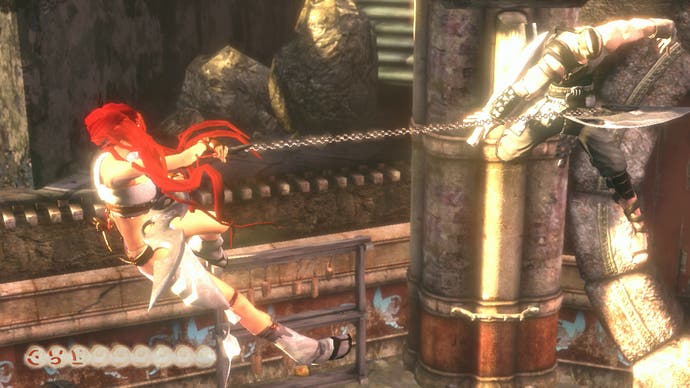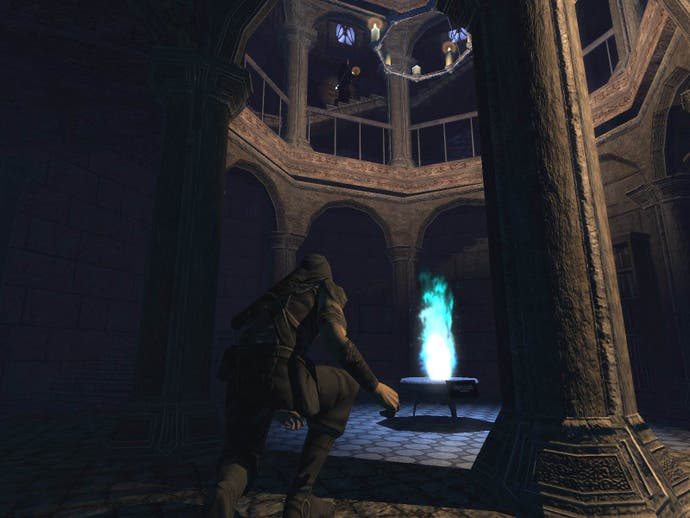Warren Spector on game development
Part 1: On formats, models, and differing design philosophies.
Nice as it would be for there to be one "winner" so we could work with some standards for a change, I don't see it happening. I think your analysis seems pretty spot on. The next gen console guys, plus PC, will compete with each other while Nintendo grabs all the Nintendo fans. I mean, I don't get the impression Nintendo even cares about what Sony and Microsoft do. They just do their own thing, which is completely cool.

If all we do with the power of next gen hardware is increase our poly counts we're doomed. We have to use that power to create new gameplay experiences - up the simulation level... find new ways to exploit physics... create more interactive worlds than we could dream of before... create virtual actors that can do more than run and shoot.
Well, I'M right, of course! No, seriously, there's clearly room for a variety of approaches to game design - god, it'd be boring if we all believed the same stuff and made the same kind of game! Fact is, I've been having this argument with Gabe for, oh, let's see... how long have I known him? Nine years? Yeah, all that time. And before that, I used to argue with Richard Garriott and others at Origin about the same damn thing. I'll go to my grave believing I'm right.
But, really, I find the idea that one design philosophy is "right" and another "wrong" (or even that one is better than another) incredibly odd. I mean, is Star Wars better than The Godfather? Is Lord of the Rings better than Goodfellas? Should Stephen Spielberg make nothing but action-adventure movies because they make more money than his more "serious" efforts? Should we elevate Tom Clancy or Dan Brown to the top of the writing heap and stop reading Shakespeare? Does anyone think all music should be aimed at the top of the Billboard charts? I sure don't want to live in a world where everyone sounds like Britney Spears... oh, wait, I already do... Anyway, you get my point...

Wow, lots of points to address here - this is going to take some words...
First, and most trivial, I've never said that players should see one-sixth of your content. My "rule" has always been that every player should see about 75 per cent of your content, with another 25 per cent reserved for unique player experience. That's kind of a dopey measure, in a sense, because it implies that the best way to differentiate player experience is to handcraft a lot of paths through a map and a bunch of branching dialogue for NPCs to spout.
There are other ways to get at unique experience that don't require massive amounts of hand-crafted content. But I do believe that generating some content, knowing everyone won't see it, has huge value.
For players, a multipath/multisolution game offers the knowledge that if they're clever they will see and do things no one else has ever seen or done. How can you not want to play a game like that? A year after we shipped Deus Ex, I saw someone solve a particular game problem in a way I'd never seen anyone try before, and I was sitting there with him wondering if his solution would work. I mean, I helped make the game, and I'd played through that part of the game a hundred times and watched probably a thousand playthroughs and I was seeing something I'd never seen before. No game-on-rails or rollercoaster ride can possibly touch that for a thrill!
And check out the forums where people talk about how they solved a particular problem and others respond in amazement that they'd never thought to try that approach. Listen to people debate what one endgame choice said about you as a person, as opposed to what another endgame would have said...
That is so much cooler than listening to people agree how cool it was when they all killed some monster in exactly the same way, or got across some chasm in exactly the same way, or solved some goofy puzzle in exactly the same way.
Beyond that, multipath/multisolution games offer players who aren't great at combat, say, another option (stealth, dialogue, hacking - whatever).
They can keep playing your game instead of throwing a controller or mouse across the room in frustration. I mean, not to pick on Half-Life 2 (which I happen to enjoy immensely), but if I'm not good enough to get past an enemy or a carefully crafted puzzle my only option is to stop playing, and maybe never buy another Half-Life game. In Deus Ex (for another example I enjoy immensely!) if you can't fight your way past a problem, try something else.
Something else will work. (There were no puzzles in DX, so I can't address that - we only had problems, and problems, by their very nature, are open to solution in a variety of ways.) Anyway, giving players ways to keep playing your game seems like a good idea to me. How is that a waste of time and money?
So, to try to wrap this up in something less than book length, I don't believe it's ever a waste of time to give players real choices, rather than fake ones. If all you're doing is putting players on rails and rocketing them through your story, why not just build a roller coaster or make a movie? If the only choice a player gets to make is which weapon to use to kill a bad guy, you've completely wasted that player's time. Roller coaster rides are immense amounts of fun, but really, all they do is provide an adrenalin rush and a moment's distraction from the workaday world. Games can be more. Movies are terrific storytelling devices - I love movies - but movies already exist. I don't need to make them. (Well, I kinda want to produce a movie someday, but that's another matter entirely...) If all you're doing is telling yourstory to players (with the added attraction of getting to pick a gun once in a while), why bother?
If you're not "wasting" development time by allowing players to explore your world, advance the plot their way, test behaviours and see the consequences, I believe you're wasting players' time - and that's a far, far worse sin than wasting some time and dollars on stuff some players might not see.
Check back tomorrow for the second half of our lengthy chat with Warren Spector about all things game development. Well, we don't talk about the best swivel chairs and why all game developers seem to have untidy desks, but we do continue to talk about games that offer more than one path, some of his previous work, and the games he's enjoying at the moment.








